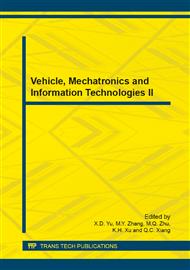p.1706
p.1711
p.1717
p.1721
p.1728
p.1734
p.1739
p.1743
p.1747
A New Type of Hexagonal Fault-Tolerant Clustering Algorithm
Abstract:
In view of the problem that present most clustering algorithms are given priority to save energy but ignoring fault tolerance, this paper puts forward a new kind of hexagonal fault-tolerant clustering algorithm (HFTC). By increasing the middle management node, which controls nodes rate of false positives and managements topology within the cluster, this algorithm completes nondestructive substitution between nodes. At the same time, the introduction of backup nodes, it also improves the networks fault tolerance. The simulation experiments show that HFTC can guarantee a high fault tolerance in networks, make the network to send more packets, and prolong the network life effectively.
Info:
Periodical:
Pages:
1728-1733
Citation:
Online since:
March 2014
Authors:
Keywords:
Price:
Сopyright:
© 2014 Trans Tech Publications Ltd. All Rights Reserved
Share:
Citation:


